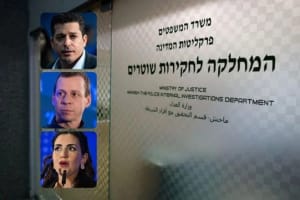As Christian pilgrims visit Israel for Holy Week, local Christians complain of increasing violence
Tensions in Jerusalem are high as Jews, Christians and Muslims observe overlapping holy days

While thousands of international Christian pilgrims have arrived in Israel – especially Jerusalem – for Holy Week, Old City Christians have spoken of an increase in harassment and vandalism in the months since the coalition’s assumption of power in November.
The Latin patriarch of Jerusalem, Pierbattista Pizzaballa, told reporters last week that there has been a disruption in the “balance” between the religious communities in Jerusalem.
“What we are seeing is that, what we call the status quo, the balance between the different communities – Jews, Muslims, Christians – is not respected anymore,” he said. “That aspect is problematic for me, that they consider Christians as guests. We are not guests. We are part of the identity of the city.”
The pressure felt by the local Christian population has not affected Christian pilgrimage and tourism to Israel. Thousands of Christian pilgrims attended Palm Sunday processions in Jerusalem’s Old City, launching the Holy Week celebrations.
This year, the Holy Week for Catholics and Protestants began on April 2 and will end with Resurrection Sunday, on April 9. For Orthodox and Eastern denominations, Holy Week starts one week later.
Data from the Franciscan Pilgrims’ Office indicate that at least 261,353 pilgrims are expected to travel to Jerusalem this year, with the number of visits around Holy Week reaching even higher numbers than before the COVID-19 pandemic.
Miral Sedrak, a 22-year-old university student and Christian from Jerusalem, said she is encouraged to see the Christian pilgrims.
“When pilgrims come to visit, it feels like the church has a soul. As Christians, our numbers are small, so when we see pilgrims, we feel part of something bigger, that we matter,” she said.
Local Christians have complained about an increase in incidents of persecution and vandalism since the start of the year. In January, two Jewish teens were arrested after vandalizing graves in the Mount Zion Protestant cemetery.
While incidents of harassment have been reported in the past, locals say there has been a noticeable increase since the government coalition came to power.
“Because of the government’s situation, some extremists, they feel like they have a protector,” said Father Alberto Pari, who holds the title General Secretary of the Custody. “Nobody will stop them if they do something that maybe they were thinking to do also before. But then there was more control from the police or they were not supported by some political leaders.”
“Unfortunately after this government was elected, there are those who feel they can do whatever they want. That they can lift up their fists and nothing will happen to them,” said Amir Dan, spokesperson for the Franciscan Custody in Jerusalem.
In particular, local Christians have pointed to National Security Minister Itamar Ben Gvir, whose divisive rhetoric was seen as problematic even before he joined the coalition.
In 2015, in his profession as a lawyer, Ben Gvir defended a man convicted of arson for setting fire to the Roman Catholic Church of Loaves and Fishes at Tabgha. Ben Gvir also defended the leader of the radical group Lehava, which has protested at both Christian and Messianic Jewish events and has said that Israel should expel all Christians.
Fr. Francesco Patton, the Catholic Church’s Custos of the Holy Land and guardian of the Christian holy places in the Holy Land, said that the lives of local Christians are made “unbearable by radical local groups with extremist ideologies.”
Patton noted that the Israeli government does not condone the incidents of harassment and that they are carried out by radical groups in Jerusalem.
“These radical groups do not represent the government or the people of Israel,” he said. “But as with any extremist faction, a radical minority can too easily burden the lives of many, especially if their activities go unchecked and their crimes are unpunished.”
The Patriarch of the Orthodox Church in Jerusalem, Theophilos III, said that “terrorist attacks, by radical Israeli groups, targeting churches, cemeteries, and Christian properties, in addition to physical and verbal abuse against Christian clergy, have become almost a daily occurrence that evidently increases in intensity during Christian holidays.”
Theophilos stated that, despite repeated appeals and requests for help from the authorities, there has not been an “appropriate reaction.”
Various churches in Jerusalem appealed to the government on Friday, asking authorities to ensure that Christians would be able to worship freely during the Holy Week celebrations.
Some political commentators suggest that the Israeli government needs to create a ministry to handle Christian affairs in order to improve the situation, as Israeli policy towards different Christian groups is often piecemeal and reactionary.

The All Israel News Staff is a team of journalists in Israel.














